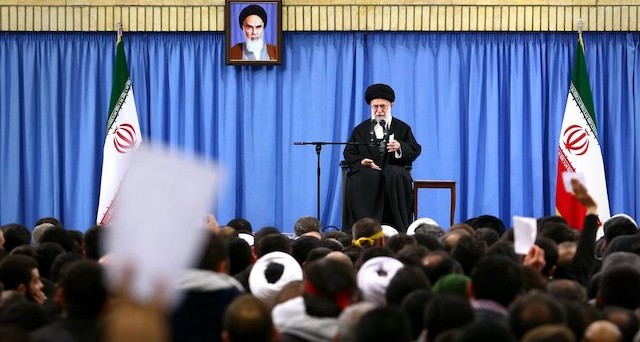Supreme Leader challenges reformists by linking them to “sedition”
Iran’s Supreme Leader has pointedly rebuffed a reformist-led appeal for reconciliation, amid economic difficulties and with a Presidential election only three months away.
Speaking to visitors in a Wednesday ceremony, Ayatollah Khamenei invoked the “sedition” of the mass protests after the disputed 2009 Presidential election to criticize the reformists, who are allied with the Government of President Hassan Rouhani:
Some people talk about “national reconciliation”; however, that does not make sense to me: the people are already united. So why do you talk about reconciliation?
Are the people against each other? Yes, people are against those who took to the streets on the day of Ashura, beating and stripping the young [paramilitary] basiji shamelessly and brutally. They are against them, and they will not reconcile with them.
The leading reformist Mohammad Khatami, President from 1997 to 2005, launched the “reconciliation” initiative in early February, saying threats from US President Donald Trump made it the “most opportune time” for building a stronger, more unified environment: “Perhaps there are some people who do not view the revolution or the system favorably but…when the country and national interests and Iran’s dignity is in danger, everybody should join together and stand up to those who want to attack Iran.”
Vice President Majid Ansari followed up for the “improvement in relations”, saying, “It would be an honor to have greater contact and communication [with Khamenei].”
“Separated by Sedition”
But, as the opening act for the Supreme Leader’s statement, juiciary head Sadegh Larijani declared, “National reconciliation is necessary in cases where substantial differences exist. There are no fundamental differences or divisions [in Iran] which require national reconciliation.”
He then condemend the reformists, saying that the “problem is not with the people” but with “those who were separated over the course of the sedition”.
The Supreme Leader further entrenched his rejection of the reformists by framing political and social issues within his declaration that the US war on Iran is not military but “economic and cultural”.
Real war is cultural & economic war, sanctions & depriving country of technology and areas of work and activity. https://t.co/38jhOQt2WF
— Khamenei.ir (@khamenei_ir) February 15, 2017
He challenged the Government and others to pursue his idea of the self-sufficiency of the “Resistance Economy” — first proclaimed in 2012 — resisting any pressure from the US and its allies after the July 2015 nuclear deal:
It is the end of the year for the “Resistance Economy”, its measures and actions; hence, officials must show what they have done to take their own measures and actions–in this regard. They should not talk about what should happen, they should talk about what has been accomplished. People’s grievances cannot be ignored: recession, unemployment, and inflation are important issues. The officials must make efforts in this regard.
However, Khamenei offered no specific ideas how to deal with issues such as continued difficulties in the recovery of trade and investment, amid ongoing US financial restrictions.
While Iran’s oil exports have recovered by about 40% since the January 2016 implementation of the nuclear deal, further growth is capped by an agreement with OPEC in December. Meanwhile, the country has struggled to confirm essential investment in the oil and gas sector, and the delivery of Airbus and Boeing planes to revive the passenger fleet has been stalled by the US financial issues and possibility of a harder line under the Trump Administration.
The economic situation has eroded some support for President Rouhani and any re-election bid; however, conservatives continue to show uncertainty about a candidate to represent them — and possibly the Supreme Leader — in May.
Rouhani’s victory in June 2013 came after the conservatives fielded three different candidates, splitting their vote and giving the centrist — approved as a consolation candidate after former President Hashemi Rafsanjani was barred from standing — an unexpected first-round triumph.
The centrist-reformist List of Hope also surpassed expectations in February 2016 by taking the largest share of seats in the Iranian Parliament.
Foreign Ministry Rejects US Statement on Opposition Leaders’ 6-Year House Arrests
Iran’s Foreign Ministry rejected a US statement noting the six-year detention of Green Movement leaders Mir Hossein Mousavi, Mehdi Karroubi, and Zahra Rahnavard.
The State Department’s Mark Toner spoke on Tuesday about “the six-year anniversary of the detention without formal charges of former senior Iranian officials”.
Foreign Ministry spokesman Bahram Ghasemi responded yesterday, “The government and nation of Iran have had very bitter experiences of Americans’ sporadic verbal interventions of irrelevant nature in their country’s domestic affairs.”
He insisted that Iran was always pursuing the implementation of the Constitution over citizens’ rights.
Mousavi and Karroubi — candidates in the 2009 Presidential election “won” by Mahmoud Ahmadinejad — and Rahnavard, Mousavi’s wife and a prominent academic and artist, have been held under strict house arrest without charge since February 2011.
Karroubi’s son Mohammad Taghi told the International Campaign for Human Rights in Iran:
The whole issue comes down to Mr. Khamenei’s personal decision. He ordered the house arrests against the law… We have to see if he’s willing to listen to his own close advisers and act or not. We have to wait and see what impact these political pressures will have on the regime. The decision is in Mr. Khamenei’s hands.
Iran’s political atmosphere has changed. Those who want to end the house arrests now include factions within the regime itself. This is a positive development, but we must bear in mind that there is a great deal of resistance to ending the house arrests, and against granting political freedoms and civil rights.
More than 25,000 Iranians have signed an online petition asking the President, Parliament, and the judiciary to resolve the situation.

